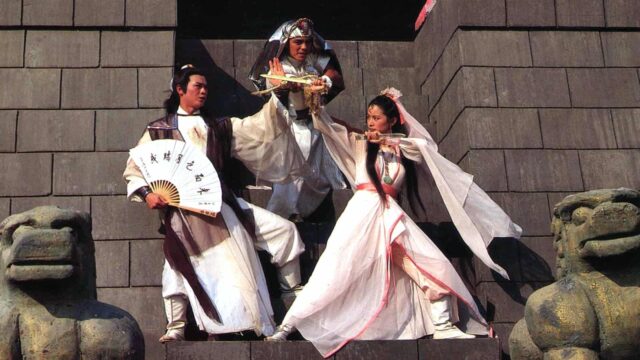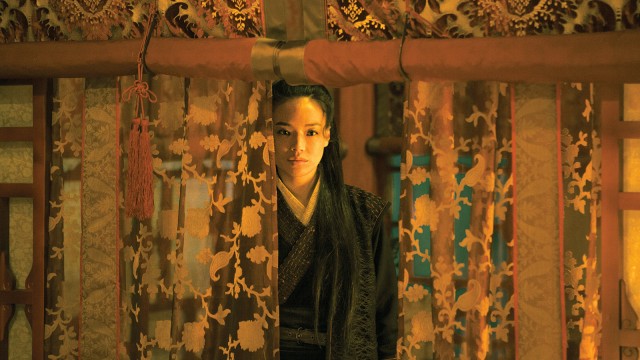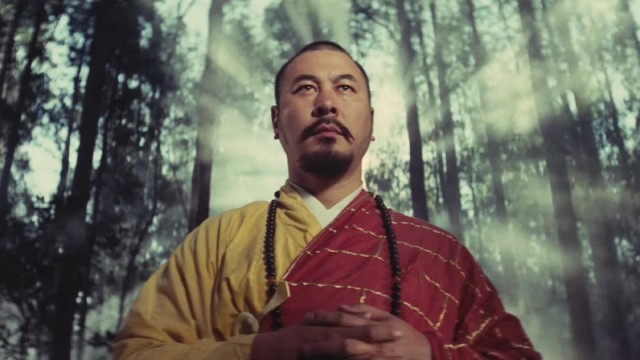
US premiere of 2K remaster of Chang Peng-yi’s The Night Orchid is part of Metrograph series
OLD SCHOOL KUNG FU FEST: SWORD FIGHTING HEROES EDITION
Metrograph
7 Ludlow St. between Canal & Hester Sts.
April 21-30
metrograph.com
When I was a kid, I spent many a rainy Saturday afternoon watching Kung Fu Theater, a weekly serving of wuxia films, poorly dubbed martial arts films from Hong Kong that were among the coolest movies I’d ever seen, filled with indecipherable plots and fantabulous weapons. It didn’t get much better than The Story of Drunken Master, Five Fingers of Death, and Bruce Lee squaring off against Chuck Norris and Kareem Abdul-Jabbar.
Last year the RZA and DJ Scratch joined forces for the tribute song “Saturday Afternoon Kung Fu Theatre,” in which the RZA declares, “Can we watch another movie next Saturday? / Be sure to tune in next week / for The Masked Avengers and Heroes of the East.”
You don’t have to wait for next week, as Metrograph is currently showing the tenth “Old School Kung Fu Fest: Sword Fighting Heroes Edition” through April 30. The tenth festival consists of fifteen flicks, little known and classic, including the US premiere of Lin Jing-jie’s three-and-a-half-hour documentary The King of Wuxia, about King Hu; Hu’s 1969-71 A Touch of Zen, 1973 The Fate of Lee Khan, and 1975 The Valiant Ones; Yang Shih-ching’s 1970 The Grand Passion, made by A Touch of Zen’s production manager during downtime of that film; a 2K remaster of Chang Peng-I’s 1983 The Night Orchid; Sung Tsun-shou’s 1969 Iron Mistress; and Chris Huang’s 2000 The Legend of the Sacred Stone.
Below are some of the other highlights of the series, which is presented by Metrograph and Subway Cinema in association with Taipei Cultural Center in New York.
THE GHOST HILL (Ting Shan-hsi, 1971)
Sunday, April 23, 3:00
metrograph.com
The Swordsman of All Swordsmen trilogy concludes with Ting Shan-hsi’s fantastically mad The Ghost Hill. You don’t need to have seen Joseph Kuo’s The Swordsman of All Swordsmen or Lung Chien’s The Bravest Revenge — although the former is screening at Metrograph April 22-23 and the latter is available virtually on Metrograph at Home — to get instantly sucked into the grand finale, in which Tsai Ing-chieh (Tien Peng) might at last avenge the murder of his father by Yun Chung-chun (Chen Bao-liang). The wuxia epic begins with a high-flying battle between Tsai and Feng Chun-ching (David Tang Wei), aka Black Dragon Hero, on a rocky beachfront, overseen by the Grand Master (Kao Ming), who will present to the winner the coveted Purple Light Sword, bestowing upon him the title of Master Swordsman.
Tsai takes home the trophy, but it is immediately stolen from him by thieves who also slay his master. Tsai and his goofy but loyal brother head out to regain the sword and kill Yun, but it turns out that someone has already beaten them to it, although Yun’s daughter, Fei Yen-tzu (Polly Shang-kuan), an accomplished assassin known as Flying Swallow, blames Tsai for the evil deed. But soon Tsai, his brother, Fei, and Feng are teaming up to defeat the evil King Chin (Hsieh Han) and the girl he raised, Chin Man-chiao (Han Hsiang-chin), aka Princess of the Underworld, who he is grooming to be his bride.
As the men fight over the women and the women fight over the men, the action moves into Chin’s fortress, where Tsai and his merry band of homeless beggars must make it through ten boobytrapped hells in order to face Chin and his dangerous left arm.
Writer-director Ting, cinematographer Lin Tsan-ting, art director Tsao Nien-lung, and set decorator Chen Shang-lin add fab touches to every scene, from character names — Green Demon Judge, Misty Light Master, Iron Bull, and the Murdering Wonder Child to the Black and White Wuchang, the Ox Head Demon, the Yanluo Wang, and the Soul-Hunting Yaksha — to colorful costumes, lavishly cheesy sets, a boiling oil bath, epic sound effects and music (with Theremin!), ultracool weapons, and plenty of fire and blood, along with watermelons and a special beheading.
There are also a number of awesome quotes. “We can never understand the grievances of the previous generation,” Yen-tzu posits. “The gates of heaven are open but you choose to knock on hell’s door,” King Chin warns Tsai.
The Ghost Hill evokes such later films as Steven Spielberg’s Raiders of the Lost Ark, Chang Cheh’s Five Venoms, Quentin Tarantino’s Kill Bill, and Ang Lee’s Crouching Tiger, Hidden Dragon, but it’s in a class all by itself. And it should be special watching it not alone on a rainy day but in a theater packed with wuxia fans likely to be hooting and hollering all the way.
THE ASSASSIN (刺客聶隱娘) (NIE YINNIANG) (Hou Hsiao-hsien, 2015)
Saturday, April 29, 7:00, and Sunday, April 30, 9:15
metrograph.com
Taiwanese master Hou Hsiao-hsien’s first film in eight years is a visually sumptuous feast, perhaps the most beautifully poetic wuxia film ever made. Inspired by a chuanqi story by Pei Xing, The Assassin is set during the ninth-century Tang dynasty, on the brink of war between Weibo and the Royal Court. Exiled from her home since she was ten, Nie Yinniang (Hou muse Shu Qi) has returned thirteen years later, now an expert assassin, trained by the nun (Fang-Yi Sheu) who raised her to be a cold-blooded killer out for revenge. After being unable to execute a hit out of sympathy for her target’s child, Yinniang is ordered to kill Tian Ji’an (Chang Chen), her cousin and the man to whom she was betrothed as a young girl, as a lesson to teach her not to let personal passions rule her. But don’t worry about the plot, which is far from clear and at times impossible to follow. Instead, glory in Hou’s virtuosity as a filmmaker; he was named Best Director at Cannes for The Assassin, a meditative journey through a fantastical medieval world. Hou and cinematographer Mark Lee Ping-Bing craft each frame like it’s a classical Chinese painting, a work of art unto itself. The camera moves slowly, if at all, as the story plays out in long shots, in both time and space, with very few close-ups and no quick cuts, even during the martial arts fights in which Yinniang displays her awesome skills. Hou often lingers on her face, which shows no outward emotion, although her soul is in turmoil. Hou evokes Andrei Tarkovsky, Akira Kurosawa, Ang Lee, and Zhang Yimou as he takes the viewer from spectacular mountains and river valleys to lush interiors (the stunning sets and gorgeous costumes, bathed in red, black, and gold, are by Hwarng Wern-ying), with silk curtains, bamboo and birch trees, columns, and other elements often in the foreground, along with mist, fog, and smoke, occasionally obscuring the proceedings, lending a surreal quality to Hou’s innate realism.
There are long passages of silence or with only quiet, barely audible music by composer Lim Giong, with very little dialogue, as rituals are performed, baths are prepared, and a bit of black magic takes place. The opening scenes, set around a breathtaking mountain abbey in Inner Mongolia, are shot in black-and-white with no soundtrack, like a silent film, harkening to cinema’s past as well as Yinniang’s; when it switches over to color, fiery reds take over as the credits begin. Throughout the film, the nun wears white and the assassin wears black, in stark contrast to the others’ exquisitely colorful attire; however, the film is not about good and evil but something in between. Shu and Cheng, who played a trio of lovers in Hou’s Three Times, seem to be barely acting in The Assassin, immersing themselves in their characters; Hou (The Puppetmaster, Flowers of Shanghai) gives all of his cast, professional and nonprofessional alike, a tremendous amount of freedom, and it results here in scenes that feel real despite our knowing better. Sure, a touch more plot explication would have been nice, but that was not what Hou was after; he wanted to create a mood, an atmosphere, to transport the actors and the audience to another time and place, and he has done that marvelously. The Assassin is a treasure chest of memorable moments that rewards multiple viewings. I’ve seen it twice and can’t wait to see it again — but I’ve given up trying to figure out exactly what it’s about, instead reveling in its immense, contemplative beauty. Hou’s previous full-length film was 2007’s Flight of the Red Balloon; it’s now been eight years since The Assassin, so here’s hoping his next film is on its way.
A TOUCH OF ZEN (King Hu, 1969/1971)
Sunday, April 30, 1:00
metrograph.com
King Hu’s 1969 highly influential wuxia classic, A Touch of Zen, is a three-hour epic that features an impossible-to-figure-out plot, a goofy romance, wicked-cool weaponry, an awesome Buddhist monk, a bloody massacre, and action scenes that clearly involve the overuse of trampolines. Still, it’s great fun, even if it is way too long. (The film, which was initially shown in two parts, earned a special technical prize at the 1975 Cannes Film Festival.) Shih Jun stars as Ku Shen Chai, a local calligrapher and scholar who is extremely curious when the mysterious Ouyang Nin (Tin Peng) suddenly show up in town. It turns out that Ouyang is after Miss Yang (Hsu Feng) to exact “justice” for the corrupt Eunuch Wei, who is out to kill her entire family. Hu (Come Drink with Me, Dragon Gate Inn) fills the film with long, poetic establishing shots of fields and the fort, using herky-jerky camera movements (that might or might not have been done on purpose) and throwing in an ultra-trippy psychedelic mountain scene that is about as 1960s as it gets. Winner of the Technical Grand Prize at Cannes, A Touch of Zen is ostensibly about Ku’s journey toward enlightenment, but it’s also about so much more, although I’m not completely sure what that is.

